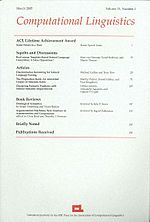Computational Linguistics (journal)
- Computational Linguistics (journal)
-
Computational Linguistics is a peer-reviewed academic journal in the field of computational linguistics. It is published quarterly by MIT Press for the Association for Computational Linguistics (ACL). The journal includes articles, squibs and book reviews.
The journal was established as the American Journal of Computational Linguistics in 1974 by David Hays and was originally published only as microfiche until 1978. George Heidorn transformed it into a print journal in 1980, with quarterly publication. In 1984 the journal was renamed Computational Linguistics. Since 2009, it has become an online-only open access journal, freely available to anyone.
Editors
Editors in chief:
- David Hays (1974–1978)
- George Heidorn (1980–1982)
- James F. Allen (1982–1993)
- Julia Hirschberg (1993–2003)
- Robert Dale (2003–present)
External links
Categories:
- Computational linguistics
- Linguistics journals
- Publications established in 1974
- Open access journals
- MIT Press academic journals
- Quarterly journals
- English-language journals
Wikimedia Foundation.
2010.
Look at other dictionaries:
Computational linguistics — This article is about the scientific field. For the journal, see Computational Linguistics (journal). Linguistics … Wikipedia
Association for Computational Linguistics — Infobox Non profit Non profit name = Association for Computational Linguistics Non profit Non profit type = professional organization founded date = 1962 founder = location = origins = Association for Machine Translation and Computational… … Wikipedia
Computational — may refer to: Computer Computational algebra Computational Aeroacoustics Computational and Information Systems Laboratory Computational and Systems Neuroscience Computational archaeology Computational auditory scene analysis Computational biology … Wikipedia
Computational humor — is a branch of computational linguistics and artificial intelligence which uses computers in humor research. It is not to be confused with computer humor (i.e., jokes about computers, programmers, users, and computing). It is a relatively new… … Wikipedia
Computational mathematics — involves mathematical research in areas of science where computing plays a central and essential role, emphasizing algorithms, numerical methods, and symbolic methods. Computation in the research is prominent.[1] Computational mathematics emerged … Wikipedia
linguistics — /ling gwis tiks/, n. (used with a sing. v.) the science of language, including phonetics, phonology, morphology, syntax, semantics, pragmatics, and historical linguistics. [1850 55; see LINGUISTIC, ICS] * * * Study of the nature and structure of… … Universalium
Computational visualistics — The term Computational visualistics is used for addressing the whole range of investigating scientifically pictures “in” the computer.[1] Contents 1 Overview 2 Areas covered 2.1 Algorithms from »image« to »im … Wikipedia
Computational creativity — (also known as artificial creativity, mechanical creativity or creative computation) is a multidisciplinary endeavour that is located at the intersection of the fields of artificial intelligence, cognitive psychology, philosophy, and the arts.… … Wikipedia
Journal of Consciousness Studies — Infobox Journal title = Journal of Consciousness Studies editor = Valerie Gray Hardcastle discipline = Cognitive Science, Neurophysiology, Philosophy language = English abbreviation = JCS publisher = Imprint Academic country = United States… … Wikipedia
Corpus linguistics — is the study of language as expressed in samples (corpora) or real world text. This method represents a digestive approach to deriving a set of abstract rules by which a natural language is governed or else relates to another language. Originally … Wikipedia

